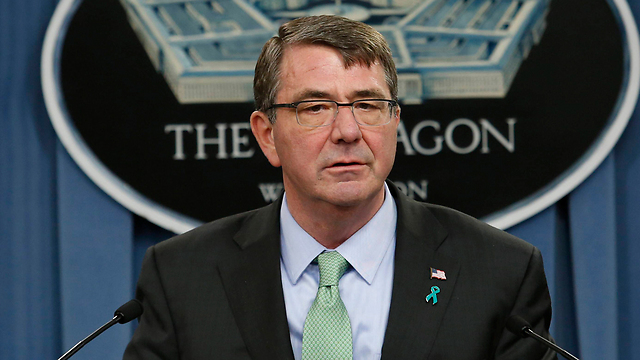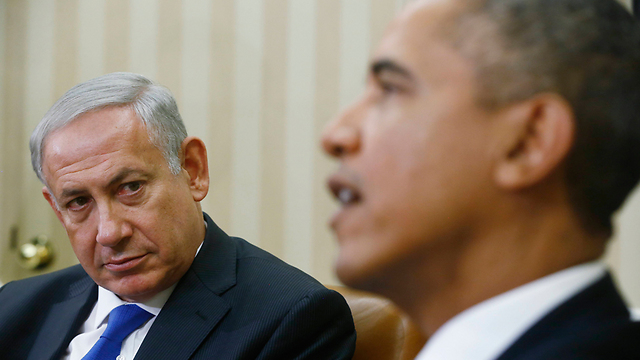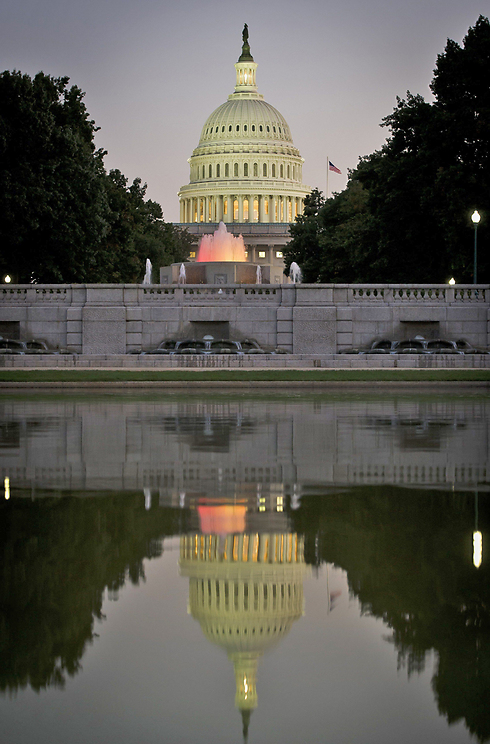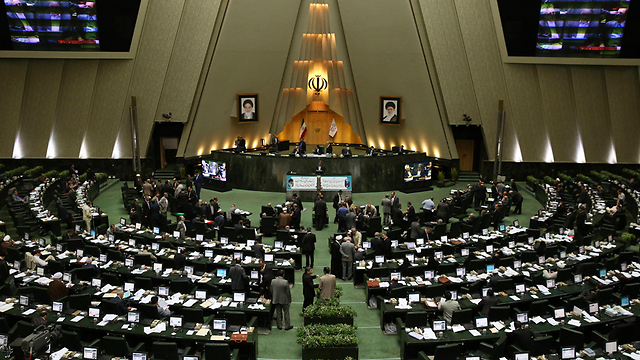
Netanyahu is betting against Obama in Congress battle against Iran deal
Analysis: The prime minister is not worried that further confrontation will cause the US president to be less generous in his compensation package to Israel. He is willing to bet the battle in Congress against the Iranian deal is worth the risk. Meanwhile, he is waiting for January 2017, when a new president enters the White House.
Until this week, Netanyahu thwarted any attempt by the heads of the defense establishment to talk to the Americans about the compensation package Israel will receive over the deal with Iran. Netanyahu is worried that that a negotiation at this time will weaken the chances of defeating the Obama administration in Congress. For the first time in his life, and perhaps the last, he maintains that he that hateth gifts shall live. His refusal is so firm that the prep work in the defense establishment was done in secret, almost underground. When American sources said there were talks, the IDF vehemently denied. It's a decision for the political echelon, they said. The IDF doesn't interfere with political decisions.
As often happens, one interfered with another, one argument mixed with a different one. The fight against the Iranian nuclear program became part of the fight for the defense budget. Over the past year, the Defense Ministry received 59 billion shekels, and the ministry complained bitterly. This year the defense establishment is demanding more - around 63 billion shekels. The Finance Ministry demanded to get the number down to 54 billion shekels. These fantastical numbers don't mean much to the tax paying citizen, but they have wide-reaching consequences to the economy and to society, to the government's stability, to the entire state budget. Generous American compensation could be the miracle cure to the government's chronic financial woes, a bridge over troubled waters. A billion dollars from Obama, perhaps a billion and a half on a good day, and everything is right again.

But Netanyahu is not satisfied. Not yet. One of the ministers talked to me this week about the changes Netanyahu has been going through since the elections - in fact, since election night. I raised the possibility it could be a frantic sort of movement, like on a rollercoaster, between smugness and depression, between mania and depresia. Netanyahu reached the very top: The spirit of God came upon him, no one in the world can overcome him; no one is half as good as he is. We know him, I said. After the mania, comes depresia.
The minister corrected me. The only thing that changed with Netanyahu is that he learned how to say no, he told me. All of those years he was trying hard to please, to tell people to their face what they expected to hear. Now he is slowly becoming someone who insists on his own truth. Not behind one’s back, not with his head down: Tell it to one’s the face.
If that is the situation, I said, we're lucky: We have not only a prime minister, foreign minister, health minister, a minister of regional development, and a communication minister - we have a leader.
The next battle
The coming 80 days are sure to be fascinating. Sixty days were allocated for the American Congress to review the details of the agreement with Iran. Experts will testify. The president, his State and Energy secretaries, senior officials from the White House and the Pentagon, will all brief the Senators and Congressmen, focusing their efforts on the Democrats who remain on the fence. AIPAC, the pro-Israeli lobby, will recruit all of its resources for the campaign against the agreement; the Saudi will do their part; a lot of promises will be made in secret, a lot of money will change hands. The American Congress is corrupted by definition: That is how the founding fathers made it - as a group of lobbyists for their districts, for their donors and for themselves. Every now and again, this institute can overcome its members' narrow, provincial scope, and makes the right decisions, fateful decisions. Usually, this miracle happens for the wrong reasons.
At the end of the 60 days, the Republican majority in both Houses will vote against the agreement. At that very same day, Obama will veto the decision. The decision will return to the two Houses. In ten days, they'll go to a vote. According to the Constitution, a two-third majority is required in each House to override a president's veto. This kind of event is unusual, but not unprecedented: One of the Likud ministers told me this week that throughout history, Congress bypassed presidents' vetoes 100 times.
Assuming all 54 Republican Senators vote against the agreement and against the veto, 13 Democratic Senators will be required to reach a two-third majority in the Senate. This is a very difficult task, but not impossible. One key person is Chuck Schumer, a Jewish Senator from New York and one of the leaders of the Democratic Party. Schumer is torn between his loyalty to the president and his Jewish voters. Another key person is Ben Cardin from Maryland, the minority leader at the Senate Committee on Foreign Relations.
The House of Representatives is a lot less predictable. Even if all 244 Republicans vote against the president - which is not a sure thing by any means - 43-45 more Democrats will be needed in order to override the president's veto. American political analysts estimate the chances of that happening are small. This is also the belief in the Prime Minister's Office. Despite that, Netanyahu is not giving up: He talks as someone who intends to keep fighting to the end. In August, many Congressmen are scheduled to arrive in Israel, perhaps some of the presidential candidates as well. All of them will hear harsh criticism about Obama and his administration from Netanyahu, things that could immediately turn into weapons in the inter-American election battle.
Israel had prime ministers who received quite a lot of admiration from the American public, each for different reasons: Ben-Gurion, Golda Meir, Yitzhak Rabin, Menachem Begin, Ehud Barak. None of them were anything like Netanyahu - not in his prominence, not in his involvement in inter-American politics, not in the controversies he causes among the Jewish community and the American institution, not in the admiration some have for him and the resentment others feel. For better or for worse, Netanyahu is the main story right now. Not Iran, not Obama, not even Israel: Netanyahu.
The emerging comparison is not to Winston Churchill, whom Netanyahu admires as a leader, but to Don Quixote, the Knight of the Sad Countenance. The battle for heroic justice is romantic and attracts attention. But the results are less impressive.
The day after Obama
I asked one of the ministers in the know what would happen of the battle ends in victory, what happens if over two-thirds of Congress say no to the president's veto. He became quiet for a moment, like someone who considers this possibility for the first time. "It's unclear," he said. "It's possible the Majlis, the Iranian parliament, decides to reject the agreement and go for the bomb. The Iranians might decide, in retaliation, to violate the agreement, but only marginally. The world would remove the sanctions; America continues with theirs. It'll be a big mess."
Is this mess good for the Jews, I asked. He didn't know how to respond. It's a shame, because this question will play a major role in the battle over the agreement's approval. It appears a negative decision in Congress would not kill the deal: It would cut off one of its legs. The members of Congress will want to know what happens then, what would Iran do, what would the administration do, what would Israel do, what would China, Russia, Europe are going to do, how would that affect the war in Syria, would this not drag the United States back into the Middle East's wars?
They will want to know what happens if the battle ends with a loss. Will the generous compensation package Obama plans on offering Israel today not shrink as the confrontation between Netanyahu and the president becomes worse? Is Israel not taking a risk when it confronts a sitting president, over a year before the end of his term, and a decisive majority in American public opinion?
Netanyahu responded to these questions in private conversations. He is convinced the risk will not increase. Obama, he says, is a rational person. He won't determine his policy on the security needs of an ally based on emotional baggage; he has a responsibility. If he shakes off this responsibility, Congress will bring him back into line. Either way, the changes to the size of the aid package are minor compared to the fateful, historic battle to cancel the agreement.
We should not rule out the possibility, American officials tell me, that Netanyahu is looking ahead, beyond Obama. In January 2017, a new president will enter the White House. Netanyahu believes he will be Republican and sympathetic. This new president, Netanyahu believes, will welcome him to the White House as a hero and grant him his every request.
When it comes to the compensation package, Netanyahu's analysis is reasonable. Obama represses his emotions. His rhetoric is replete with emotions; his decision-making process is rationalistic. He is too analytic, too proud, perhaps too arrogant, to surrender his decision-making to the settling of personal scores. It's not his style. Obama gave an interview this week to Thomas Friedman of the New York Times. Seemingly, one of the objectives of this interview was to comfort the Sunni countries, America's allies, who lost much because of the agreement with Iran. Obama chose to attack them for their contribution to terror and violence, for their responsibility to the fact the Arab Spring, according to him, has turned into a winter.
Obama is not James Baker, who in 1992, on the eve of elections in Israel, convinced President Bush senior to withhold $10 billion in guarantees from Yitzhak Shamir. Shamir lost the elections, and the guarantees were given to his successor, Yitzhak Rabin.
But there are many fronts in the Jerusalem-Washington ties, and not all of them have something to do with the Iranian nuclear threat. The Palestinian issue is dormant right now. The Middle East provides far more fascinating issues, far more explosive, to discuss. Obama can bring the Palestinian issue back to the fore at once if he raises his own proposal in the fall, or removes the United States' automatic veto at the UN. The Palestinians won't get a state out of it, but Israel will be humiliated and boycotted.
The final vote will take place in Congress at the end of September or in early October. At that very same time, the UN General-Assembly will convene. Netanyahu plans to arrive for the General-Assembly meeting. So does Obama. Will they speak before the decision is made in Congress, or after it? Will they meet? American diplomats are seeking high and low for a harmless time to schedule a meeting. So far, they're having a hard time finding anything.














